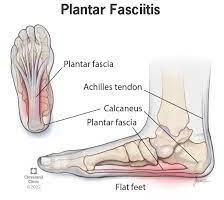The nurse is performing an assessment of a client with possible plantar fasciitis in the right foot. What assessment finding would the nurse expect in the right foot?
Severe pain in the arch of the foot
Multiple toe deformities
Redness and severe swelling
Numbness and paresthesia
The Correct Answer is A
Choice A rationale: Plantar fasciitis typically presents with severe pain in the arch of the foot, especially during the first steps in the morning or after prolonged periods of rest.
Choice B rationale: Multiple toe deformities are not typically associated with plantar fasciitis.
Choice C rationale: Redness and severe swelling are not typical findings in plantar fasciitis.
Choice D rationale: Numbness and paresthesia are not common findings in plantar fasciitis.
 |
Nursing Test Bank
Naxlex Comprehensive Predictor Exams
Related Questions
Correct Answer is A
Explanation
Choice A rationale: After visual inspection, the next step typically involves auscultation, which allows the nurse to listen for bowel sounds and gather information about
gastrointestinal function.
Choice B rationale: Percussion involves tapping the abdomen to assess density or abnormal masses but usually follows auscultation.
Choice C rationale: Palpation, both light and deep, follows percussion in the sequence of an abdominal examination.
Choice D rationale: Similar to light palpation, deep palpation follows auscultation and percussion in the sequence of an abdominal examination.
Correct Answer is A
Explanation
Choice A rationale: The Tensilon test involves injecting edrophonium, and in myasthenia gravis, temporary improvement in muscle strength confirms the diagnosis by demonstrating increased acetylcholine activity at the neuromuscular junction.
Choice B rationale: This describes the pathophysiology of myasthenia gravis but doesn’t directly confirm the diagnosis via the Tensilon test.
Choice C rationale: While this may be seen in myasthenia gravis, the Tensilon test specifically aims to observe improved muscle strength after administration.
Choice D rationale: While the presence of these antibodies is a characteristic of myasthenia gravis, the Tensilon test is used to assess the immediate response to the medication for diagnostic confirmation.
Whether you are a student looking to ace your exams or a practicing nurse seeking to enhance your expertise , our nursing education contents will empower you with the confidence and competence to make a difference in the lives of patients and become a respected leader in the healthcare field.
Visit Naxlex, invest in your future and unlock endless possibilities with our unparalleled nursing education contents today
Report Wrong Answer on the Current Question
Do you disagree with the answer? If yes, what is your expected answer? Explain.
Kindly be descriptive with the issue you are facing.
